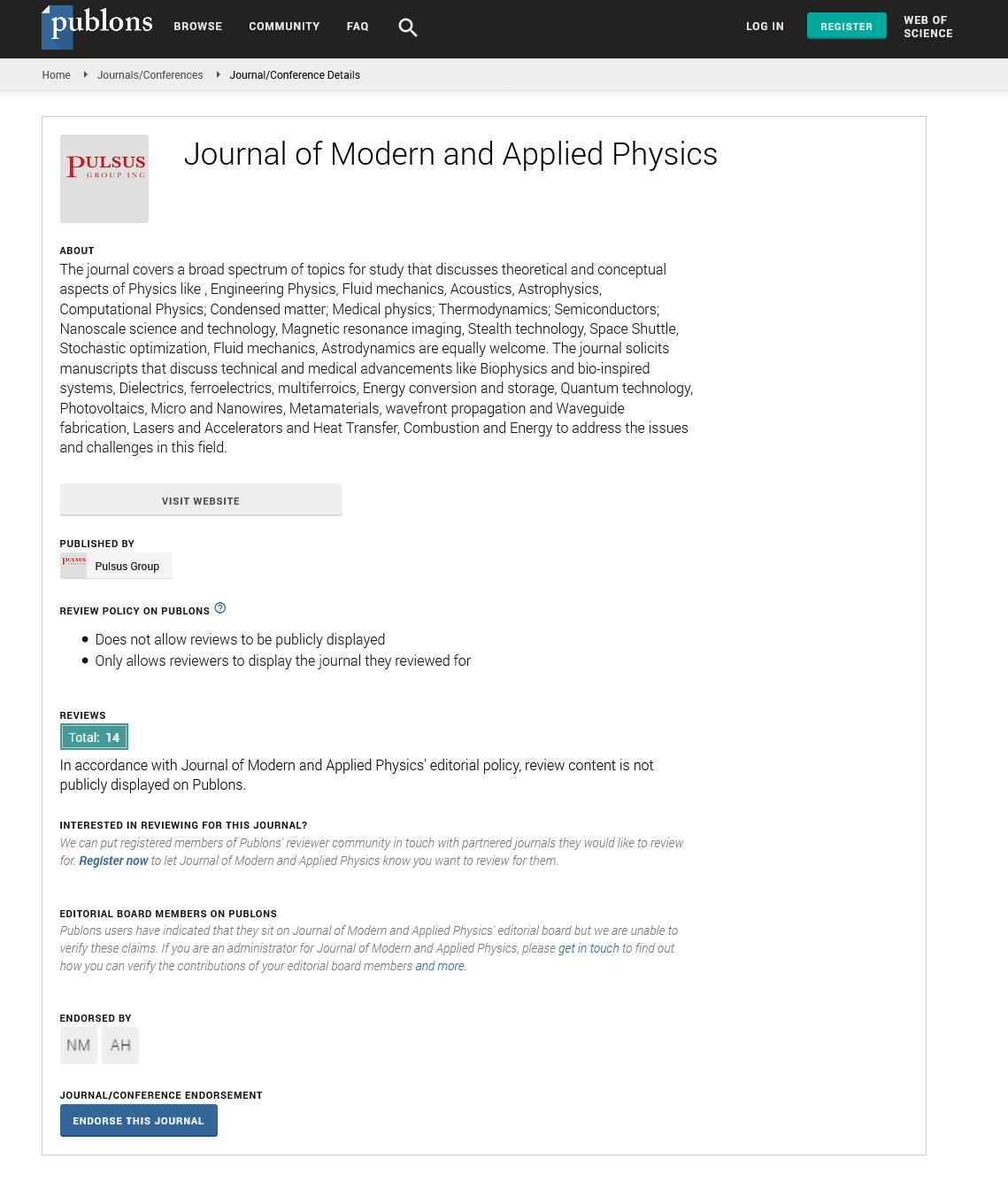Regarding Schrodinger s equation
Received: 09-Jul-2023, Manuscript No. puljmap-23-6578; Editor assigned: 11-Jul-2023, Pre QC No. puljmap-23-6578(PQ); Accepted Date: Jul 21, 2023; Reviewed: 14-Jul-2023 QC No. puljmap-23-6578(Q); Revised: 18-Jul-2023, Manuscript No. puljmap-23-6578(R); Published: 11-Aug-2023, DOI: 10.37532.2022.6.3.1-2
Citation: Kountandos S., Regarding Schrodinger equation. J Mod Appl Phys. 2023; 6(3):1-2.
This open-access article is distributed under the terms of the Creative Commons Attribution Non-Commercial License (CC BY-NC) (http://creativecommons.org/licenses/by-nc/4.0/), which permits reuse, distribution and reproduction of the article, provided that the original work is properly cited and the reuse is restricted to noncommercial purposes. For commercial reuse, contact reprints@pulsus.com
Abstract
Continuing previous research in this journal we find the coefficient of efficiency of the cyclic process taking place inside the atom. It is found to be proportional to the volume to surface ratio. The reason for this is that electromagnetic waves hit the surface with an energy flux and the wave is transformed to a longitudinal photon
Key Words
Coefficient of efficiency; Quantum thermodynamics; Hidden variables of quantum mechanics
Introduction
From the previous research published in this journal we have given proof for some facts regarding a cyclic process taking process in quantum mechanics which we need to mention again. Spacetime as in general relativity is being distorted by the mass. It becomes cyclic and new volume is created In the thermodynamic cycle the coefficient of efficiency as we have found out is:

We had also discovered that the dielectric susceptibility chi is the true probability of finding the particle in a point in space against the probability per volume which we know:

The model we have adopted for the electron is that of a swirling droplet. Naturally we may assume that mass is distributed spherically. We have found regarding this line of thinking a vorticity field:

As new volume is being created by the presence of mass which induces a curvature in spacetime we have to wonder how the surfaces are connected to the volume. We do know that the free energy is proportional to the surface times the surface tension so we take the freedom to rewrite the Gibbs thermodynamic potential as:

In equation (4) sigma is the surface tension and K is the spacetime curvature connected to the fine structure constant and the Compton wavelength through a simple relationship if we consider it to be inversely proportional to the relativistic radius of the electron:

From equation (4) we deduce that the pressure is:

From equation (6) we come to the following conclusion:

Therefore the coefficient of efficiency of the cyclic process is proportional to the surface to volume ratio as was to be expected since the electromagnetic energy is absorbed through surfaces and then inside the atom it becomes a volume longitudinal wave of volume compression and rarefaction.
Another argument which supports our view of things is the following. By expanding equation (6) we find:

We are going to take an intervention which is useful to the process. The observer in quantum mechanics observes spacetime through solid angles Omega:

In equation (9) tau is spacetime interval. We also remind the reader that:

Pressure was defined as:

From equations (10) and (11) we arrive at:

Through the combined use of equations (12) and (7) we find the following fact:

Conclusion
Future work: Through many years of research we have reached towards a completely consistent system of thermodynamic relationships regarding quantum mechanics. This is vital because quantum mechanics formalism was developed as to be exploited through taking mean values of quantities plus solving the equations for finding the energy values and then inserting them into the big statistical ensembles for calculating truly observable physical entities.
Future work: Through many years of research we have reached towards a completely consistent system of thermodynamic relationships regarding quantum mechanics. This is vital because quantum mechanics formalism was developed as to be exploited through taking mean values of quantities plus solving the equations for finding the energy values and then inserting them into the big statistical ensembles for calculating truly observable physical entities.
One of the outcomes of general relativity is that through curving of spacetime the angles around a big mass should be quantized in the sense that they become multiple integer values of 2 times pi. We deal with this by inserting the solid angles of the observer. The solid angles slice 4D spacetime but exist in 3D configurations in space. It is also profound that the phase phi of the wave function is no single valued.
Another outcome of general relativity is that a spinning object should attract spacetime like a warp. This is the role of the spin and this is why angular momentum is of such value.
We have discussed the fact that a photon from being a surface wave once absorbed it becomes a longitudinal wave primarily of polarization. This is why the coefficient of efficiency is the volume to surface volume (the kinetic energy). This is compliant with yet another result of general relativity, the fact that pressure may curve spacetime. Kinetic energy is contained in the pressure formula and it gives directly a measure of space curvature.
In future work we are going to discuss what psi, the wave function is finally. We believe that since the talk is on polarization what is truly waving (as a vector thus existing wave) is the position vector that is the wave function multiplied by the radius vector.
By splitting the Laplacian into angular and radial parts and then using Schrodinger equation we find:

Spin may also participate in equation (14) We hope that we have contributed to the field of research of hidden variables.





